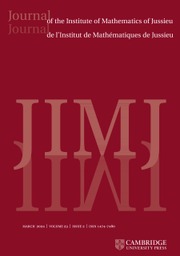Crossref Citations
This article has been cited by the following publications. This list is generated based on data provided by Crossref.
Yokura, Shoji
2019.
Oriented bivariant theory, II: Algebraic cobordism of S-schemes.
International Journal of Mathematics,
Vol. 30,
Issue. 06,
p.
1950031.
Annala, Toni
2020.
Bivariant derived algebraic cobordism.
Journal of Algebraic Geometry,
Vol. 30,
Issue. 2,
p.
205.
Elmanto, Elden
Hoyois, Marc
Khan, Adeel A.
Sosnilo, Vladimir
and
Yakerson, Maria
2020.
Modules over algebraic cobordism.
Forum of Mathematics, Pi,
Vol. 8,
Issue. ,
Kiem, Young-Hoon
and
Park, Hyeonjun
2021.
Virtual intersection theories.
Advances in Mathematics,
Vol. 388,
Issue. ,
p.
107858.
Annala, Toni
2021.
Precobordism and cobordism.
Algebra & Number Theory,
Vol. 15,
Issue. 10,
p.
2571.
Annala, Toni
2022.
Base independent algebraic cobordism.
Journal of Pure and Applied Algebra,
Vol. 226,
Issue. 6,
p.
106977.
Annala, Toni
2023.
Algebraic Spivak’s theorem and
applications.
Geometry & Topology,
Vol. 27,
Issue. 1,
p.
351.
Yokura, Shoji
2023.
Handbook of Geometry and Topology of Singularities IV.
p.
307.
Yokura, Shoji
2023.
Riemann–Roch formulas for universal bivariant theories.
European Journal of Mathematics,
Vol. 9,
Issue. 1,

